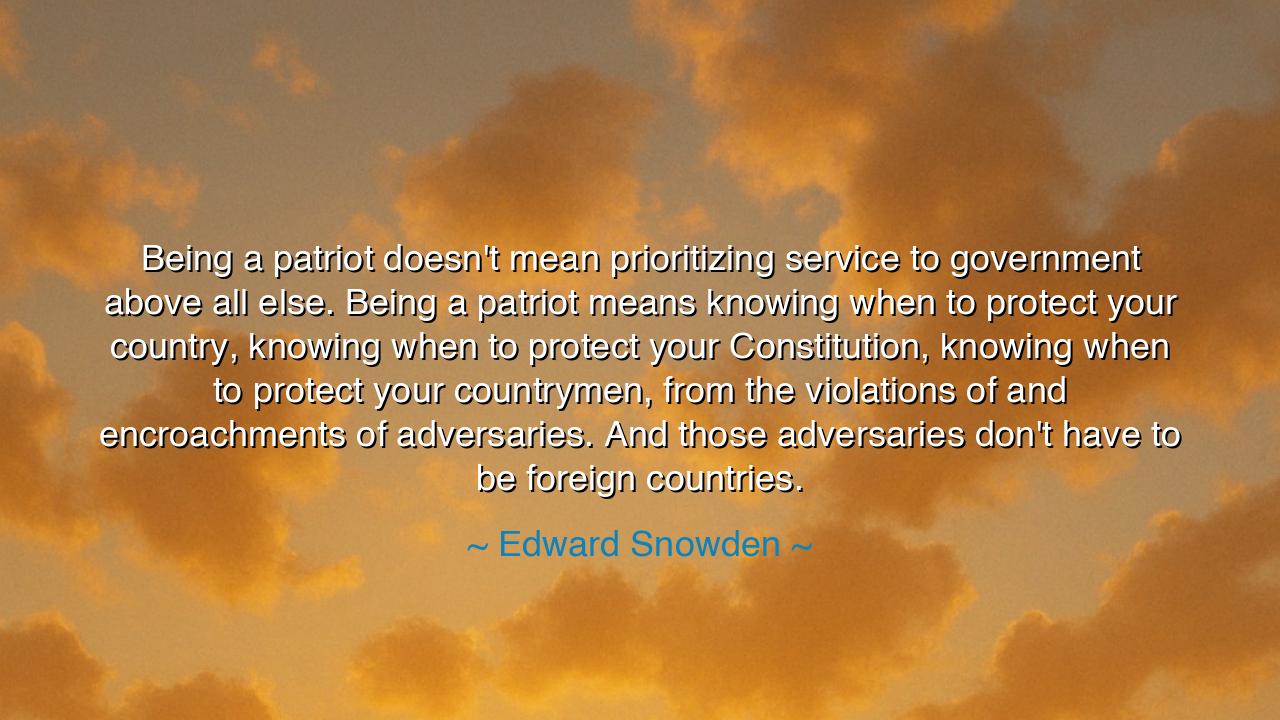
Being a patriot doesn't mean prioritizing service to government
Being a patriot doesn't mean prioritizing service to government above all else. Being a patriot means knowing when to protect your country, knowing when to protect your Constitution, knowing when to protect your countrymen, from the violations of and encroachments of adversaries. And those adversaries don't have to be foreign countries.






"Being a patriot doesn't mean prioritizing service to government above all else. Being a patriot means knowing when to protect your country, knowing when to protect your Constitution, knowing when to protect your countrymen, from the violations of and encroachments of adversaries. And those adversaries don't have to be foreign countries." – Edward Snowden
Thus speaks Edward Snowden, a man who stood before the vast machinery of power and chose truth over silence. His words cut to the marrow of what patriotism truly means. For centuries, men have wrapped tyranny in the flag and called it loyalty, but Snowden reminds us that the highest allegiance of a citizen is not to rulers, but to principles—not to the government itself, but to the moral foundation upon which it stands. A patriot is not one who obeys blindly, but one who sees clearly when obedience becomes complicity.
The origin of this declaration lies in one of the most defining acts of the modern age. In 2013, Snowden revealed the secret surveillance programs through which his own government, the United States, was monitoring millions of innocent citizens. To some, he was a traitor; to others, a hero. Yet beyond those judgments lies the essence of his message: that loyalty to justice sometimes demands resistance to authority. In a world where technology had become a silent instrument of control, Snowden chose to expose what was hidden, risking exile and persecution to preserve the ideal of liberty.
The heart of his quote lies in the tension between government and conscience. True government exists to serve the people; when it forgets that, when it elevates itself above the law it was meant to uphold, it becomes the very adversary it was sworn to resist. Snowden reminds us that adversaries need not come with foreign flags or armies—they can arise from within, cloaked in patriotism, demanding obedience in the name of security. It is the duty of every free soul to discern this difference, to recognize when devotion becomes submission and when silence becomes betrayal.
History, too, bears witness to this eternal struggle. Consider Sophie Scholl, the young German student who, during the dark reign of the Nazis, distributed leaflets denouncing the regime’s crimes. She was condemned and executed, yet her courage revealed the truest form of patriotism: love of country uncorrupted by fear of its rulers. Like Snowden, she understood that the duty of a patriot is not to protect the image of the state, but the soul of the nation—its conscience, its truth, its humanity. For the state can survive rebellion, but it cannot survive the death of integrity.
Snowden’s words also remind us of a more subtle truth—that freedom is fragile when citizens stop watching the watchers. In every age, the greatest danger to liberty is not invasion from without, but complacency from within. When people trade privacy for comfort, truth for convenience, or courage for conformity, they become the architects of their own servitude. The patriot’s burden, then, is vigilance—to guard not just borders, but the invisible walls of conscience and law that protect the human spirit from tyranny.
And yet, his message is not one of rebellion alone, but of responsibility. To protect the Constitution is to protect the very covenant that binds a people to their ideals. It is not hatred of government that moves the true patriot, but love—love fierce enough to confront wrongdoing, love strong enough to demand transparency, love wise enough to distinguish between the state and the nation, between authority and virtue. The government is but the steward; the people are the keepers of the flame.
The lesson, then, is timeless: patriotism is not submission—it is stewardship. It is the courage to speak truth when lies are comfortable, to defend justice even when it costs dearly. To be a patriot is to love one’s country enough to hold it accountable.
And so, the practical actions are these: Question power, for unexamined authority breeds corruption. Learn your rights, for ignorance is the gate through which tyranny enters. Speak when conscience compels, even if your voice trembles. Stand not only against foreign foes, but against domestic deceit. Remember always that loyalty to your country means loyalty to its principles, not its politicians; to its people, not its power. For in the end, the truest patriots are not those who serve their government blindly—but those who, with clarity and courage, serve the truth that makes a nation worth defending.






AAdministratorAdministrator
Welcome, honored guests. Please leave a comment, we will respond soon